Case In English GrammarA noun or pronoun's case is its grammatical purpose. In modern English, there are just three cases: subjective (he), objective (him), and possessive (his). These may appear more recognizable in their traditional English forms - nominative, accusative, and genitive. In English Language, there isn't a dative case. 
First, some more wonderful news. We managed to get rid of most of our case, and as a consequence, English is simpler than many other languages since nouns as well as certain indefinite pronouns (anyone, someone, everyone, and so on) only have a unique case form for the possessive. Nonetheless, there are some traces of old English, and pronouns have distinct features in all three contexts and must be used with caution. But, the pronoun cases are straightforward. There are just three of them :
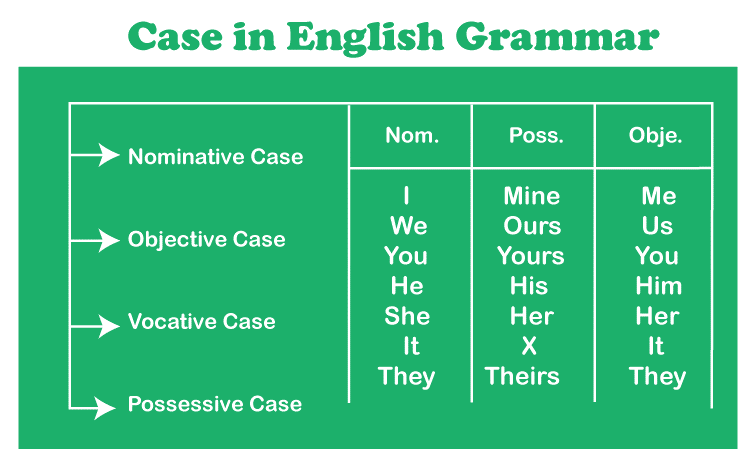
Types Of Cases in English GrammarDo you like playing team sports? Certain team positions have unique responsibilities. The goalie's responsibility in hockey is to keep the opposing team from scoring. The position holder in American football holds the football steady for the field goal maker. 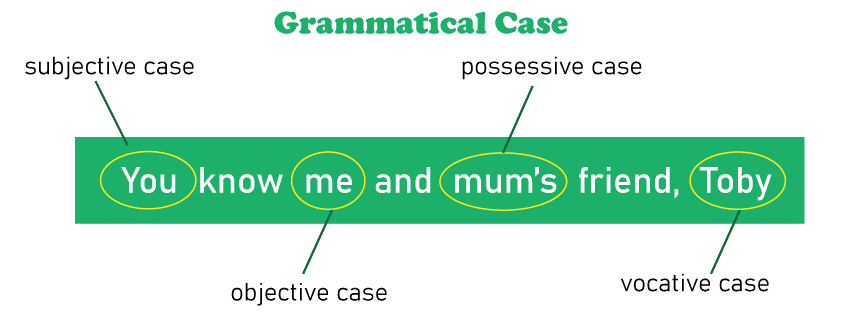
Consider grammatical situations to be team positions if you consider language as a team sport. They explain the many functions of pronouns. In modern English, only three instances are common: subjective, objective, and possessive. 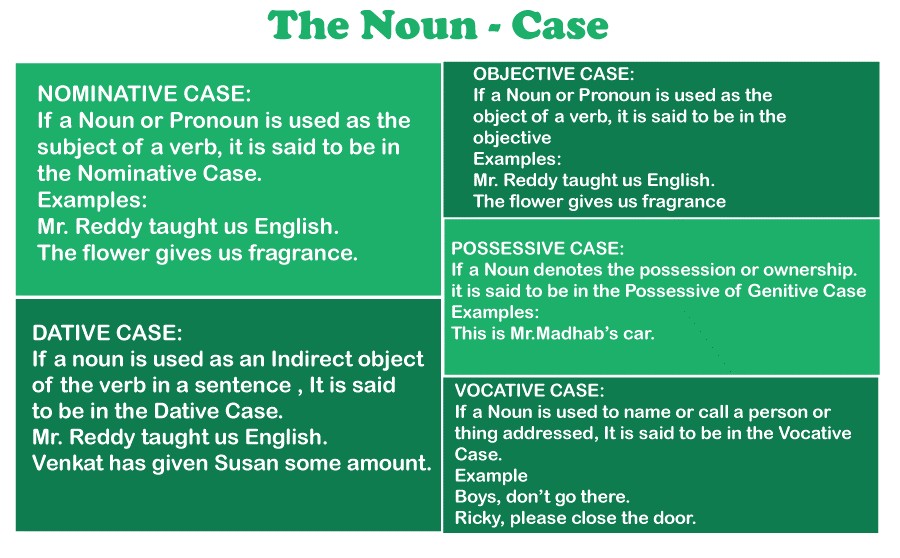
The Subjective CaseIt is in the subjective case whenever a pronoun is the subject of a clause or sentence. As a result, I, you, he, she, it, we, they, and who are subjective case pronouns. The Objective CaseThe following pronouns are in the objective case. These act as objects of verbs or prepositions: me, you, him, her, it, us, them, and whom. The Possessive CasePossession is commonly indicated using the apostrophe along with the alphabet S with nouns (or just the apostrophe, in the case of most plural nouns). Possession is demonstrated by pronouns utilising possessive case forms. Possessive pronouns are classified into two categories.
Did you observe that certain types of pronouns appear in many instances? Pronouns can be as diverse as athletes, who may like more than one game. It's fascinating to learn about the various ways in which each member of the team help each other out, and it's fun to know the grammatical situations! Just these pronouns, as well as who and its derivatives, are stressed in all three instances (subjective, objective, possessive). The first two cases (subjective and objective) in nouns are identical and are referred to as the common case. Since the sense of case is mostly lost as a result of this simplification, the few errors that can be done are made frequently, even by native speakers, few of them so frequently that they are now practically right by prescription. Why Is Case in Grammar Important?We've covered some German and some Bosnian in this article, and there's a purpose for that. Understanding about the different instances is vital for learning languages because several nouns, pronouns, adjectives, determiners, and other numbers take different forms based on their cases. The case is simple for Britons. Some of us are a little sloppy with apostrophes in possessed nouns or the vocative case, yet everyone is great with pronouns in all of their instances. That being stated, here are three notable points concerning the case. (Point 1) Be careful with possessive apostrophes. Several people struggle with the requirements for constructing possessive-case nouns, and grammar checkers typically can't help as incorrect versions are frequently feasibly correct variants from the grammar checker's standpoint. I have one cat, not two, one. I definitely only have one cat. Blue is the colour of my cats' house. incorrect (This is incorrect (it should be cat's), but a spellchecker would miss it because cats' house (house with more than one cat) is a grammatically sound term. The previous sentences are ignored by the grammar checker. It only checks the cats' house.) (Point 2) Remember to use a comma after the vocative case. You might have never heard of the vocative comma, yet it is useful in a variety of situations.
Keep a watchful eye out for this as well. If your sentence concludes with a word in the vocative case, make sure you finish it appropriately before beginning a new one. For instance- Take it from me, sweetie, it's not true. incorrect (This is known as a run-on mistake. It is not possible to end a statement with a comma and then create another sentence.) Accept it from me, darling. It's not correct. - This is correct Point (3) Apostrophes should not be used in possessive-case pronouns. Apostrophes are utilized with possessive-case nouns (for example, pratibha's nose), but not employed with possessive-case pronouns, notably yours, hers, ours, or theirs, which are especially prone to this error. Male deer lose their horns in wintertime. The cows lose their's in the summertime. incorrect sentence. In addition, the possessive determiner its lacks an apostrophe. There isn't, believe it or not. It's is always an abbreviation for it is or has. A kitty always lands on it's feet. incorrect statement. Cases And Their ExamplesThere are 4 cases in English Grammar. These include - Subjective, Objective, Possessive and Vocative Case. Now let us understand these in detail with examples; Subjective (Nominative Case)A subjective case emerges whenever a noun or a pronoun acts as a subject in a statement. Example:

Objective CaseWhenever a noun or a pronoun acts as an object in the phrase, an objective case occurs. Example:
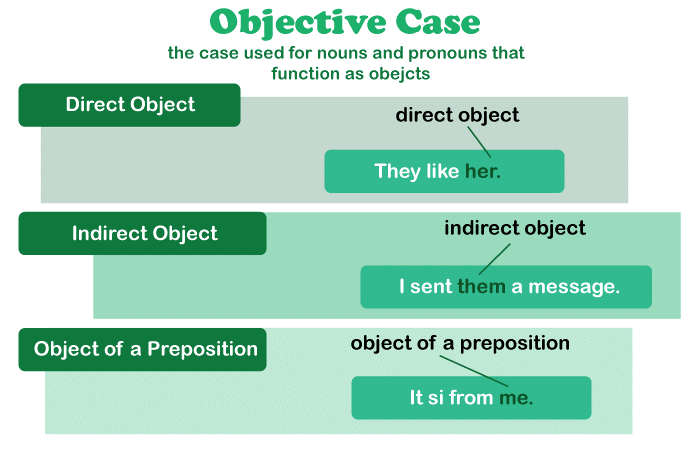
Possessive CasePossessive cases denote a possession or belonging connection among two nouns or a noun and a pronoun. Example:
NOTE: The pronoun modifies or transforms its form in different cases .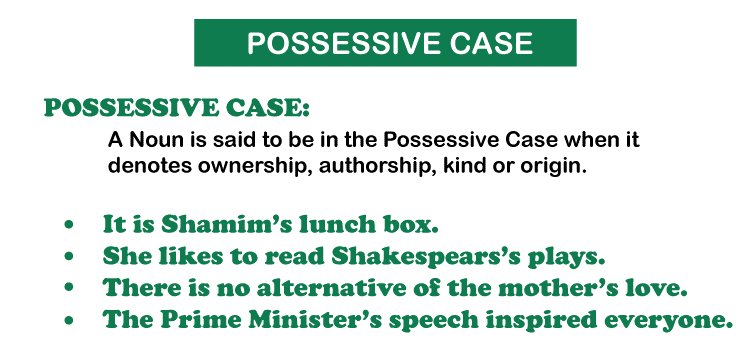
Vocative CaseAnother type of case exists. It's known as the vocative case. In terms of spelling, this situation is equivalent to the subjective case. The vocative case denotes that an individual is being addressed directly by name. A comma separates this name. Example:
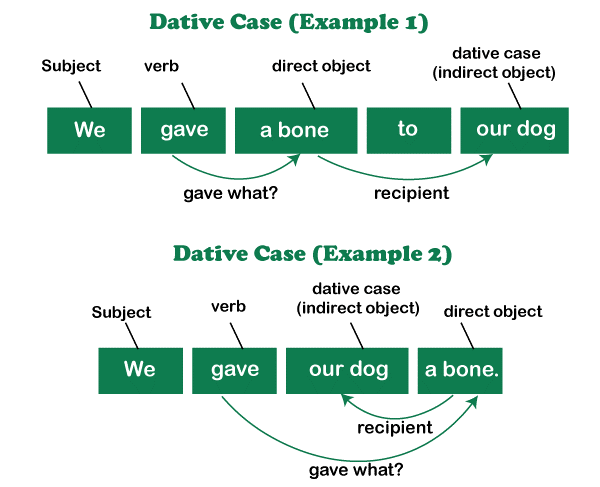
Common Mistakes to AvoidWhen it pertains to cases in English grammar, there are multiple common errors that individuals make. Here are a few examples: Confusion In Subject as Well As Object PronounsOne of the most common errors is using subject pronouns (such as "I" or "he") rather than object pronouns (such as "me" or "he") or vice versa. For instance, instead one must state "She and I visited the shop," instead of "Her and me visited the shop." Employing The Wrong Case After PrepositionsAnother typical mistake involves employing the wrong case after prepositions. Saying "between you and I" rather than "between you and me," or "for Johnny and I" rather than "for Johnny and me." Using Possessive Pronouns Rather Than ContractionsPossessive pronouns (like as "mine" or "hers") are sometimes used rather than contractions (such as "it's" or "they're"). For instance, instead of stating "The textbook is mine," people often say "The textbook is mines." Possessive Pronouns Should Not Be Used Before GerundsWhenever a gerund is used as the subject of a statement, it must be followed by a possessive pronoun. For instance, saying "Do you mind me lending your vehicle?" rather than "Do you mind my lending your vehicle?" Finally, individuals sometimes get the nominative and objective cases mixed up. For instance, instead of stating "He and I went shopping," individuals often say "Me and him went to the shopping" Learners can enhance their grasp of cases in English grammar by being mindful of these typical mistakes and practising proper usage. ConclusionThus, Cases describe the grammatical functions of nouns and pronouns in connection to the rest of the words in a statement. Also, cases in English grammar are an important element of language learning. Knowing the numerous case forms as well as how they perform in a sentence might help you speak more effectively. The nominative case is utilized for subjects and predicate nominatives, the objective case for direct objects, indirect objects, and prepositional objects, and the possessive case for possession. Understanding and using these cases correctly can make a major difference in the clarity and accuracy of one's words and speech. By studying and practising the various situations, learners can gain a greater understanding and respect of the English language.
Next TopicPunctuation in English Grammar
|
 For Videos Join Our Youtube Channel: Join Now
For Videos Join Our Youtube Channel: Join Now
Feedback
- Send your Feedback to [email protected]
Help Others, Please Share










